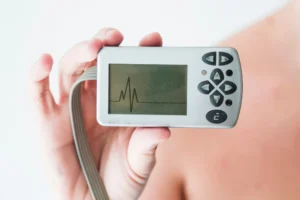 Arrhythmia is a condition characterized by irregular heartbeats, which may manifest as heartbeats that are too fast, too slow, or erratic in rhythm.
Arrhythmia is a condition characterized by irregular heartbeats, which may manifest as heartbeats that are too fast, too slow, or erratic in rhythm.
It is a common cardiac condition that requires attention and proper management to prevent complications. By understanding its types, causes, symptoms, diagnosis, and treatment options, individuals can take proactive steps to maintain heart health and improve overall well-being. Consultation with a healthcare professional is essential for accurate diagnosis and personalized treatment planning.
Understanding arrhythmia is crucial for maintaining heart health and seeking appropriate medical care when needed. Let’s delve into the essentials of this condition.
Types of Arrhythmia
Arrhythmias are classified into various types based on their origin and characteristics. Common types include:
- Atrial Fibrillation (AF). AF is the most prevalent type, involving rapid and irregular beating of the heart’s upper chambers.
- Bradycardia. This refers to a slow heartbeat, typically fewer than 60 beats per minute.
- Tachycardia. Tachycardia is characterized by a rapid heartbeat, exceeding the normal resting rate.
- Premature Contractions. These are early or extra heartbeats that disrupt the regular rhythm.
Causes of Arrhythmia
Several factors can contribute to the development of arrhythmias:
- Heart Conditions. Conditions such as coronary artery disease, heart valve disorders, and heart failure can increase the risk of arrhythmia.
- Electrolyte Imbalances. Abnormal levels of potassium, sodium, or other minerals can affect the heart’s electrical impulses.
- Medications. Certain medications, such as those used to treat high blood pressure or heart conditions, may trigger arrhythmias.
- Lifestyle Factors. Excessive alcohol consumption, smoking, drug abuse, stress, and excessive caffeine intake can predispose individuals to arrhythmias.
Symptoms
Symptoms of arrhythmia can vary depending on the type and severity of the condition. Common symptoms include:
- Palpitations or fluttering sensations in the chest
- Dizziness or lightheadedness
- Shortness of breath
- Fatigue or weakness
- Fainting or near-fainting episodes
Diagnosis and Treatment
Diagnosing arrhythmia typically involves a combination of medical history review, physical examination, and diagnostic tests, such as electrocardiograms (ECG), Holter monitoring, and echocardiograms.
Treatment options vary based on the type and severity of the arrhythmia but may include:
- Medications. Antiarrhythmic drugs to help regulate the heart’s rhythm.
- Cardioversion. Electrical cardioversion to restore normal heart rhythm.
- Ablation Therapy. A procedure to destroy abnormal heart tissue causing the arrhythmia.
- Implantable Devices. Pacemakers or implantable cardioverter-defibrillators (ICDs) to regulate heartbeats.
Lifestyle Modifications
In addition to medical treatment, lifestyle changes can help manage arrhythmias and reduce the risk of complications. These may include:
- Following a heart-healthy diet low in saturated fats, cholesterol, and sodium.
- Engaging in regular physical activity.
- Avoiding tobacco and excessive alcohol consumption.
- Managing stress through relaxation techniques or mindfulness practices.
Picture Credit: Freepik
